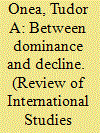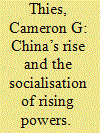| Srl | Item |
| 1 |
ID:
131700


|
|
|
|
|
| Publication |
2014.
|
| Summary/Abstract |
This article investigates the role of status considerations in the response of dominant powers to the rise of emergent states. Accordingly, the hypothesis explored is that dominant actors are prone to fear that they will lose their upper rank, and, due to this status anxiety, resist the efforts of emergent powers to match or surpass them. The article begins by explaining why political actors deem status important and puts forward a theory of status anxiety in world politics. The more pronounced is this anxiety across status dimensions (economic and military capabilities as well as prestige), the higher the likelihood of conflict. This argument is then tested against competing theories of dominant power behaviour in two cases: the relations between France and Britain from the 1740s to Napoleon and those between Britain and Germany from the 1880s to World War One.
|
|
|
|
|
|
|
|
|
|
|
|
|
|
|
|
| 2 |
ID:
140824


|
|
|
|
|
| Summary/Abstract |
The rise of China, and other states whose material power and ideational aspirations have outpaced that of their peers, presents an interesting challenge to international relations theorists. Structural theories rooted in realism tend to predict that changes in material power inexorably lead to conflict that reshuffles the pecking order at the pinnacle of the international system. Such theories also tend to ignore identity and other ideational factors that may condition the interaction of rising and dominant great powers. This article develops a theoretical approach to state socialisation of rising powers. While considering the importance of increasing material capabilities, this approach also examines the types of roles that states occupy in the international social system and the ability of great powers to socialise rising powers into what they consider to be appropriate roles. The 1995–1996 Taiwan Straits Crisis is analysed through this theoretical framework to demonstrate that although both China and the United States attempted to altercast each other in a socialisation process, neither was successful. China pursued its own, self-conceived role conceptions in the situation, as did the United States, setting the stage for renewed rivalry between the two powerful states. The case demonstrates the difficulty of constraining rising powers’ aspirations when their material power allows them to pursue the identities of their choice, even in the face of strong socialisation efforts from the dominant power and its supporters.
|
|
|
|
|
|
|
|
|
|
|
|
|
|
|
|
| 3 |
ID:
141602


|
|
|
|
|
| Summary/Abstract |
Somewhere between the foreign visits and eloquent speeches, Prime Minister Narendra Modi managed to alter – albeit slightly – the narrative about India’s status in the international order. Thanks to the reach of social media and the internet generation, it is safe to say, that, India has managed to capture global attention. Will this attention grabbing strategy translate to changes on ground? Will India soar above its present status as a dominant power in South Asia to emerge as a Great power in the future? Can India take charge of the ‘Asian Century’?
|
|
|
|
|
|
|
|
|
|
|
|
|
|
|
|